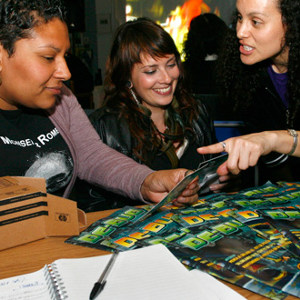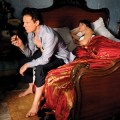Despite a torrential rainstorm, it was standing room only last Friday night at the screening of All the Ladies Say, a new film about the lives of six iconic “B girls” from New York, Chicago, Miami, Atlanta, Los Angeles and San Jose who have made it big on hip-hop’s male-dominated breakdancing scene. The room was filled with an enthusiastic crowd of street dancers, local hipsters, DJs and MCs who came out to support the South Bay International Womyn’s Day Network and Aiko Shirakawa, the San Jose artist featured in the film.
Shirakawa says she started out as a tween watching street dancers practice in her El Rancho Verde neighborhood on San Jose’s East Side. She joined her first dance group, Quick Style, in 1983 when she was 14 years old. From there Shirakawa joined the legendary Jam Patrol and went on to “lock and pop” all over the world.
In 1995 she began producing and hosting “The Best of the Best” at the Hank Lopez Community Center, which drew young breakdance aficionados from all over the Bay Area to San Jose’s East Side. She’s considered a West Coast legend in the international hip-hop community.
Shirakawa says it’s easier now, but back in the day, girl beginners who showed up to dance at clubs, classes and competitions were given a hard time.
“The men were aggressive and had no patience, tolerance or respect for women and they wouldn’t teach us or help us get better,” she says. “It was humiliating. While you were dancing, they’d talk about you, make fun of you and then they’d move you out of the room.”
Shirakawa says that 20-plus years later, women and girls still face barriers, and that’s why her group, 5th Element, joined the South Bay International Womyn’s Day Network, which hosted the film screening; part of a month-long calendar of events celebrating international Women’s Day.
This is not a throwback from the 1970s. International Women’s Day is 100 years old this March 8. And a new generation of young Silicon Valley women are using the historic celebration to mobilize a new support network. Last year, a group including many young Latinas from east San Jose came together to launch the South Bay International Womyn’s Day Network (SBIWDN), and they’ve been holding monthly meet-ups since then. Traditionally International Women’s Day celebrates the economic, political and social achievements of women; in many countries it’s a national holiday. Over the next month the SBIWDN is hosting performances, workshops, film screenings, lectures, and a march and rally. A complete listing of events is posted at www.sanjose.com.
Charlotte Casey, silver-haired, stately and sixty-something, represents Code Pink and the local Peace and Justice Center in the new group. A veteran activist, she welcomes the new blood.
“It’s the young women of color who have revived International Women’s Day and Women’s History Month,” she says. Other members come from the Youth Space at the Billy DeFrank LGBT Community Center, SOMOS Mayfair, San Jose State’s women’s studies program, the Cihuatl Tlatocan-MAIZ, Unite HERE and UFCW Local 5.
“This network is needed because women in Silicon Valley still make less than men for the same work and we don’t get the same resources, opportunities, or have the same representation in government, on any level, that men have,” Casey says.
Feeling it, San Jose City Council member Rose Herrera championed a proposal leading the city to proclaim March 2011 to be Women’s History Month. She’ll present it at the March 1 City Council meeting.
Amalia Renteria, 22, says she started Women Rising and joined the SBIWDN after not seeing any women performers at Music in the Park last year.
“I’ve interned at music labels and local music festivals and hardly saw any women performing there,” says Renteria, a SJSU Public Relations major and member of SJSU WOWI (Women on Women’s Issues).
“I go to local clubs and I don’t see women onstage, especially minority women,” she says. “I want to create space and opportunities for women to have as much representation as the males on the local music scene. The SBIWDN got me involved with so many people and connections, I realized I wasn’t the only one trying to change things in San Jose.”
Women Rising will be performing at the San Jose Rep on March 24 as part of the West Coast premiere of Karen Zacarias’ comic drama Legacy of Light. After the performance they’ll participate in a panel talking about breaking the barriers to women in the performing arts.
On March 29 they’re holding workshops for youths 5 to 18 at the Alma Community Center in San Jose on breakdancing, chalk art, poetry and media portrayals of women.
Renteria says of the workshops: “We want to show the youth that they can do what they see on TV and in videos. And we’re giving them that space to engage and empower them.”
Bearded, brim-wearing and bespectacled, standup comic Ato Walker, 31, says growing up in a matriarchal African American family made him a feminist. Walker produces a biweekly Monday night comedy show at the Britannia Arms, 173 W. Santa Clara St. in San Jose. “Comedy is rough to do for anyone,” he says, “but I don’t think people encourage women to use their voice in our society. Women are encouraged to be quiet and look pretty.”
When his girlfriend told him about this year’s plans for International Women’s Day, Walker offered to produce a special “Comedy Night @ the Brit” on Monday, Feb. 28, showcasing women comedians. “It’s empowering for a woman to talk about the issues that are relevant to her and have people laugh about it with her,” he says. “Men run the entertainment industry. They get to choose, and there are many fewer highly successful women comedians than men. I think there’s a problem with that.”
Adriana Garcia, 32, is a petite powerhouse of a community organizer who co-founded the SBIWDN. She’s well known in her community for co-founding the Movement of Action Inspiring Service (MAIZ) and Cihuatl Tlatocan, MAIZ’s women’s committee. She’s worked with, started or co-founded dozens of organizations that have worked with virtually every college and university in the area, most East Side high schools and dozens of governmental agencies and NGOs.
Garcia politely refuses to call the SBIWDN a new feminist movement.
“We aren’t like those stereotypical feminists with their fists in the air demanding equal rights,” she says. “We’re intergenerational, multilingual, multiethnic and multicultural. A lot of times progressive spaces get eaten up by white women and older women. No! It’s not happening like that now and it’s awesome in that way.”

 Apple Still Leads in Product Placement
Apple Still Leads in Product Placement  The Weekly Dish: Food & Wine Events, Feb. 23-Mar. 2
The Weekly Dish: Food & Wine Events, Feb. 23-Mar. 2 


